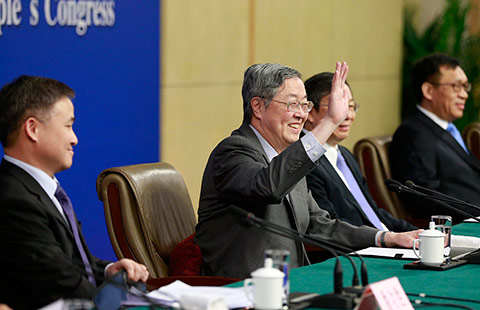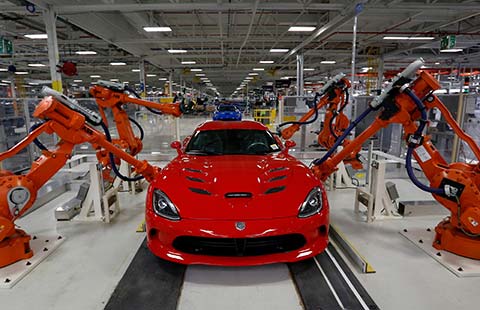China industrial output expands 5.4% for Jan-Feb
(Xinhua) Updated: 2016-03-12 13:51BEIJING - China's value-added industrial output gained 5.4 percent year on year in the first two months of 2016, the lowest monthly growth since November of 2008, official data showed Saturday.
The 5.4-percent growth retreated from the 6.8-percent increase in the Jan-Feb period of 2015 and the 5.9-percent in December of 2015. It was also lower than the 6.1-percent annual gain seen in 2015, according to the National Bureau of Statistics (NBS).
Industrial output, officially called industrial value added, is an important economic indicator. It is used to measure the activity of designated large enterprises with annual turnover of at least 20 million yuan ($3.08 million).
Industrial production accounted for 40.5 percent of China's total GDP in 2015, making it one of the leading indicators for economic growth.
In breakdown, manufacturing output expanded 6 percent in the first two months, 1 percentage point lower than that of December. Mining output growth accelerated slightly to 1.5 percent, from 1.4 percent in December.
Meanwhile, the output of the electricity, heating, gas and water sectors picked up in the Jan-Feb period by growing 1.5 percent, from the 0.8-percent decrease recorded in December, the bureau said.
NBS figures also showed that industrial output in China's western regions rose 6.8 percent year on year in the first two months, followed by 6.6 percent in central areas and 5.6 percent in eastern regions.
Industrial output in China's northeastern areas worsened in the first two months by dropping 3.5 percent, compared with the 3-percent decrease in December of 2015.
The industrial output figure was released by the NBS along with other major economic indicators for the Jan-Feb period.
China's monthly year-on-year macro data in January and February are traditionally distorted by the effect of the lunar New Year, which is difficult to remove statistically due to the short sample periods and floating dates.
That is why the NBS only publishes major activity indicators such as industrial production and fixed asset investment for January and February combined.
- No mass redundancies expected from China's economic restructuring: Official
- Outlook bright and stable as China spends big
- Global asset price turbulence brings challenges, opportunities to China
- Structural reform answer to falling global growth, productivity
- China should not be blamed for world economic slowdown
- Transforming China creates new opportunities
- China Jan-Feb activity data weak, policy easing expected
- China property investment rises 3% in Jan-Feb
- China industrial output expands 5.4% for Jan-Feb
- China retail sales rises 10.2% in Jan-Feb
- China's fixed-asset investment up 10.2% in Jan-Feb
- Rewards and risks in China's Five-Year Plan
- China to crack down on grey-market home loans: PBOC official
















